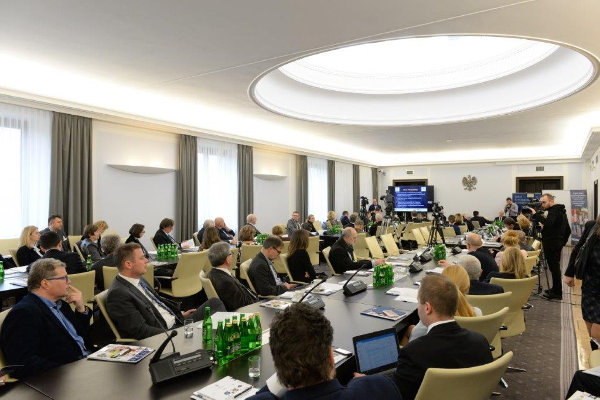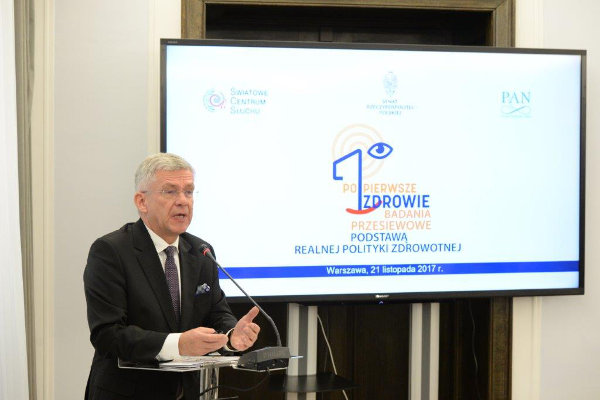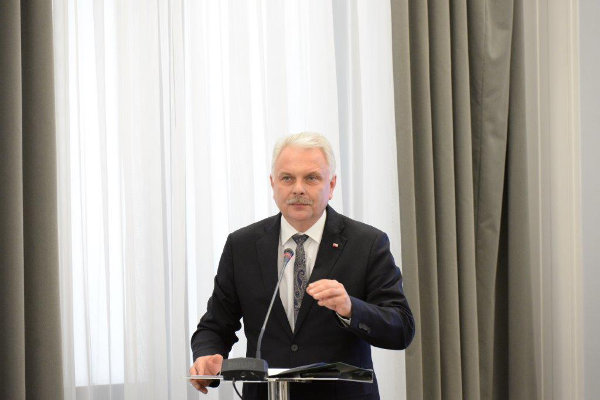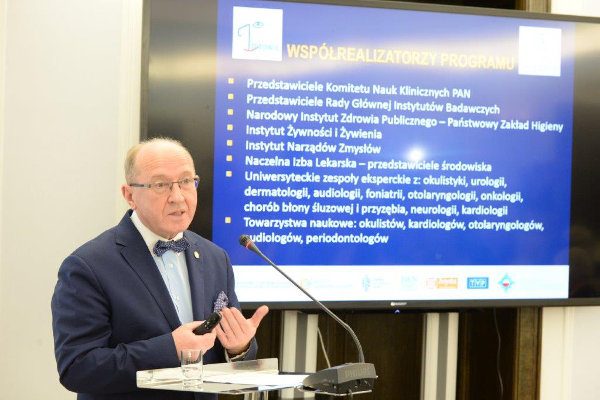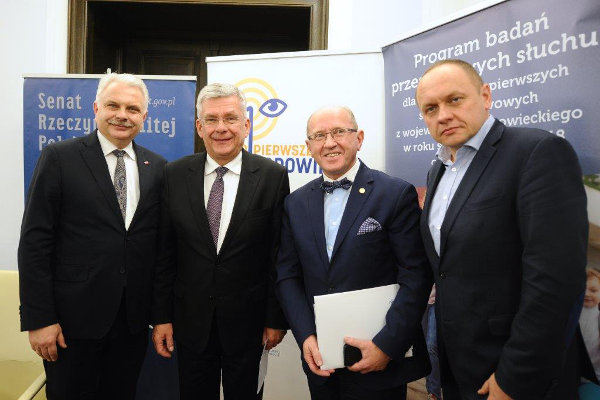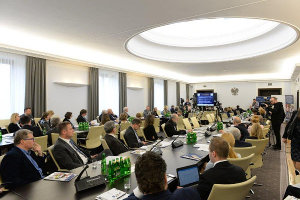 The conference ‘Health First - Screening tests as the basis of the feasible preventive healthcare’, organized in the collaboration with the Marshal of the Senate, Mr. Stanisław Karczewski, took place on 21 November 2017. The initiator of this event, Prof. Henryk Skarżyński, had invited the participants to listen to presentations of eminent scientists and clinicians – physicians representing different medical specialties, and to take part in the discussion necessary to develop and implement a wide scale program of health promotion and disease prevention in Poland. Presentation of hitherto results of the program was coupled with lectures of experts in different fields of medicine who are aware of an urgent need of expanding the preventive healthcare activities in Poland.
The conference ‘Health First - Screening tests as the basis of the feasible preventive healthcare’, organized in the collaboration with the Marshal of the Senate, Mr. Stanisław Karczewski, took place on 21 November 2017. The initiator of this event, Prof. Henryk Skarżyński, had invited the participants to listen to presentations of eminent scientists and clinicians – physicians representing different medical specialties, and to take part in the discussion necessary to develop and implement a wide scale program of health promotion and disease prevention in Poland. Presentation of hitherto results of the program was coupled with lectures of experts in different fields of medicine who are aware of an urgent need of expanding the preventive healthcare activities in Poland.
Rafał Porzeziński „Educational role of the Polish Radio in prevention of civilization diseases”
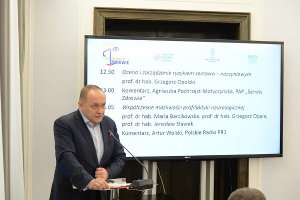 This year, on the ‘Summer with the Radio’ circuit we had visited 20 Polish towns. Apart from providing the artistic impressions, the most important point of all weekends we have spent together was the action ‘Health First’. The Mobile Medical Centers for conducting examinations were located in the vicinity of open air scenes of the ‘summer with the Radio”. The Polish Radio Program 1 has been for many years serving Poles by promoting healthy living and educating about the health problems of modern civilization. This took place in such programs as ‘Summer with the Radio’, ‘The Four Seasons’, ‘Eureka’, ‘Pill for Health’ and in a new program ‘Saved’, which present people who have recovered the joy of living after addictions, severe diseases, borderline situations and falls. In this program we present the extraordinary stories of people who have return from the death – moral, mental, psychic – to the fullness of life. ‘Saved’ is a program that gives everyone a chance to do some soul searching, to recover joy of life and hope even for those who have lost it.
This year, on the ‘Summer with the Radio’ circuit we had visited 20 Polish towns. Apart from providing the artistic impressions, the most important point of all weekends we have spent together was the action ‘Health First’. The Mobile Medical Centers for conducting examinations were located in the vicinity of open air scenes of the ‘summer with the Radio”. The Polish Radio Program 1 has been for many years serving Poles by promoting healthy living and educating about the health problems of modern civilization. This took place in such programs as ‘Summer with the Radio’, ‘The Four Seasons’, ‘Eureka’, ‘Pill for Health’ and in a new program ‘Saved’, which present people who have recovered the joy of living after addictions, severe diseases, borderline situations and falls. In this program we present the extraordinary stories of people who have return from the death – moral, mental, psychic – to the fullness of life. ‘Saved’ is a program that gives everyone a chance to do some soul searching, to recover joy of life and hope even for those who have lost it.
The radio is a perfect forum to share one’s problems, thoughts and advice, because it is safe, convenient and anonymous. The advice of the eminent experts who address personal problems of listeners cannot be overestimated. It is often easier to overcome one’s shame and call the radio than to consult a specialist. Especially the elderly people, living alone, in small towns and villages, are often afraid to ask a doctor’s help. When in their favorite radio they can hear that they are not unique, that there are many people who have the same problems, it becomes easier for them to start treatment.
Marcin Stefaniak „Pro-health activities of the TVP on the example of countrywide program ‘Health First’”.
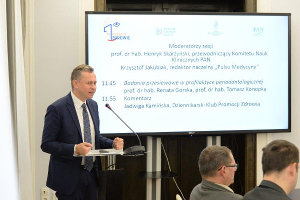 Polish TV was happy to join in the promotion of the idea of screening examinations during the ‘Summer with the Radio’ tour. In different broadcasts we have encouraged people to take advantage of free specialist consultations available in the Mobile Diagnostic Centers. We have tried to help by breaking the barrier of fear of visiting a doctor. Polish TV has been for many years – in line with its mission of public TV – promoting preventive healthcare following the guidelines of the Ministry of Health.
Polish TV was happy to join in the promotion of the idea of screening examinations during the ‘Summer with the Radio’ tour. In different broadcasts we have encouraged people to take advantage of free specialist consultations available in the Mobile Diagnostic Centers. We have tried to help by breaking the barrier of fear of visiting a doctor. Polish TV has been for many years – in line with its mission of public TV – promoting preventive healthcare following the guidelines of the Ministry of Health.
During the ‘Summer with the Radio’ tour our cameras accompanied the doctors in almost all towns they had visited and we have presented a report summarizing this action in ‘Pytanie na śniadanie’ on TVP2. Lots of information about screenings has been presented in regional channels, helping to spread information about the Program to virtually every littlest village. We are convinced that this Program should be continued and developed. The Polish TV promotes also other health promotion actions apart from supporting the ‘Health First’ Program; we have, for example, joined in the ‘Red thread’ program of the Ministry of Health that encourages blood donations.
Prof. Renata Górska „Screening in the periodontological health promotion
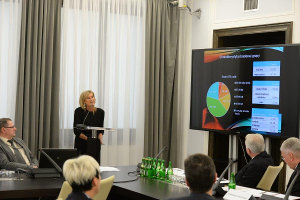 Participation in the ‘Health First’ Program is a privilege and a chance to promote knowledge about the risks related to diseases of the supporting tissues of teeth. These risks involve not only loss of teeth, but also general health problems, such as cardiac diseases, stroke, diabetes, Parkinson’s disease, rheumatoid arthritis as well as, according to the newest reports, also pancreatic cancer. They can lead to premature birth and low birth mass. Awareness of this is very low, not only in the society, but also among the first contact physicians. This is why education is very important.
Participation in the ‘Health First’ Program is a privilege and a chance to promote knowledge about the risks related to diseases of the supporting tissues of teeth. These risks involve not only loss of teeth, but also general health problems, such as cardiac diseases, stroke, diabetes, Parkinson’s disease, rheumatoid arthritis as well as, according to the newest reports, also pancreatic cancer. They can lead to premature birth and low birth mass. Awareness of this is very low, not only in the society, but also among the first contact physicians. This is why education is very important.
Data on periodontal diseases are frightening. According to the epidemiological studies conducted in 2011-2014 they affect over 90% of Poles.
During the program ‘Health First’ we have examined 713 patients. Mostly, our visitors were adults; more than 40% were people aged 45-65, another 22% people over 65 years. Majority were women (62%), although it is men who are more liable to periodontal diseases, due to addictions and aversion to visiting a doctor. Our visitors were mostly people with higher or secondary education; only 12% were people with primary education. The results of a survey about the oral hygiene were horrifying – 17% have admitted to brushing their teeth only once a day and 3.5% have said that they never brush teeth.
Prof. Tomasz Konopka „Screening in the prevention of mouth cancer”
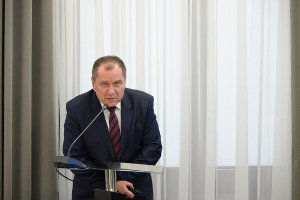 The morbidity rate of mouth cancer in Poland is higher than in other European countries. Neoplasms such as lip cancer do not metastase quickly. However, mortality from oncological diseases of oral cavity in Poland is high, because patients report to a specialist too late. Prevention of this type of neoplasm lies mostly in elimination of alcohol abuse and nicotine use, as well as HPV prevention and treatment. Screening is important – each dentist should examine patients for premalignant lesions and neoplasms. Self-testing is also important.
The morbidity rate of mouth cancer in Poland is higher than in other European countries. Neoplasms such as lip cancer do not metastase quickly. However, mortality from oncological diseases of oral cavity in Poland is high, because patients report to a specialist too late. Prevention of this type of neoplasm lies mostly in elimination of alcohol abuse and nicotine use, as well as HPV prevention and treatment. Screening is important – each dentist should examine patients for premalignant lesions and neoplasms. Self-testing is also important.
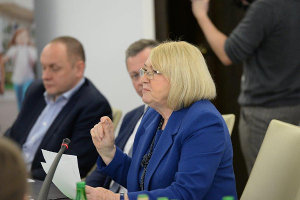 Commentary of Jadwiga Kamińska, Journalists’ Club of Health Promotion: The state of oral cavity in Poles is frightening. Only 1% of us have healthy periodontium. Its diseases are a cause of numerous systemic health problems. It is alarming that the awareness of this problem is very low. One of the reasons is the fact that in Polish schools and homes children are not taught how to properly care for their teeth. There is no countrywide education campaign addressing this topic.
Commentary of Jadwiga Kamińska, Journalists’ Club of Health Promotion: The state of oral cavity in Poles is frightening. Only 1% of us have healthy periodontium. Its diseases are a cause of numerous systemic health problems. It is alarming that the awareness of this problem is very low. One of the reasons is the fact that in Polish schools and homes children are not taught how to properly care for their teeth. There is no countrywide education campaign addressing this topic.
Prof. Iwona Grabska – Liberek „Activities of the Polish Society of Ophthalmology for the disease prevention in ophthalmology”
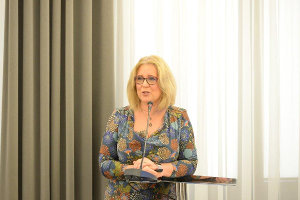 In the society that is growing older the most common eye problem are: age-related macular degeneration, cataract and glaucoma. Screening examinations allow finding persons vulnerable to a specific disease and acting to prevent its progression. Often these tests detect also other, systemic diseases, such as diabetes, whose first signs can be seen in funduscopic examination.
In the society that is growing older the most common eye problem are: age-related macular degeneration, cataract and glaucoma. Screening examinations allow finding persons vulnerable to a specific disease and acting to prevent its progression. Often these tests detect also other, systemic diseases, such as diabetes, whose first signs can be seen in funduscopic examination.
According to the WHO, 80% of patients suffering from various eye diseases are treatable. This, however, requires not only the appropriate financing, but also screening programs. Many eye diseases do not cause any impairment detectable for a patient for a long time. For this reason they often are diagnosed too late, when available treatment possibilities are limited. In Poland, data pain a frightening picture – one Pole in 3 has never had an ophthalmological examination.
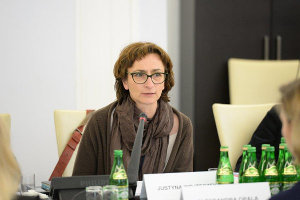 Commentary - Justyna Wojteczek Polish Press Agency PAP „Service Health”: Patients with eye problems are in a relatively good situation, as we have much more ophthalmologists in Poland than e.g. periodontologists, which makes finding a specialist much easier. Also, ophthalmology clinics are well equipped. Unfortunately, waiting time for a visit with an ophthalmologist is long and patients see a doctor too late.
Commentary - Justyna Wojteczek Polish Press Agency PAP „Service Health”: Patients with eye problems are in a relatively good situation, as we have much more ophthalmologists in Poland than e.g. periodontologists, which makes finding a specialist much easier. Also, ophthalmology clinics are well equipped. Unfortunately, waiting time for a visit with an ophthalmologist is long and patients see a doctor too late.
Prof. Piotr Radziszewski „Screening examinations in urology”
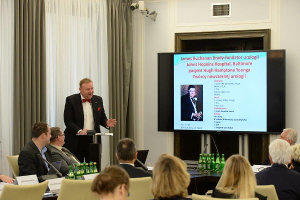 The incidence of genitourinary tumors in Poland is growing. Most common are prostate cancer, cancer of urinary bladder, renal or a testicular cancer. There are no known methods (other than avoiding tobacco smoke) of preventing these diseases. But there are ways to detect them early. Moreover, progress in medicine is such that today cancer located in kidney, urinary bladder, prostate or testis does not kill but becomes a chronic disease. New treatment methods allow achieving full recovery if neoplasm is present only in one organ, or effective control of metastatic spread.
The incidence of genitourinary tumors in Poland is growing. Most common are prostate cancer, cancer of urinary bladder, renal or a testicular cancer. There are no known methods (other than avoiding tobacco smoke) of preventing these diseases. But there are ways to detect them early. Moreover, progress in medicine is such that today cancer located in kidney, urinary bladder, prostate or testis does not kill but becomes a chronic disease. New treatment methods allow achieving full recovery if neoplasm is present only in one organ, or effective control of metastatic spread.
Unfortunately, despite the progress, survival rate of Polish patients is markedly lower than in other European countries. Poles unwillingly and seldom see an urologist. Moreover, mean waiting time for a visit is more than 1 year. The queues would be shorter if patients coming for the first visit to an urologist brought with them the results of a battery of tests prescribed earlier by a first contact doctor.
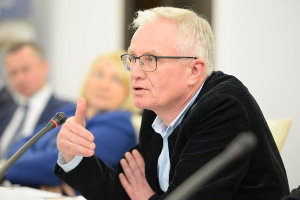 Commentary - Dariusz Dewille TVP 3: It is greatly detrimental to all males that a first contact physician does not ask about urological problems on the occasion of other consultations. It is necessary to raise the awareness of these problems not only among patients, but primarily among the physicians in the primary healthcare. We have to develop specific procedures and programs for urological screening examinations, which are not easy to conduct but necessary in the ageing society.
Commentary - Dariusz Dewille TVP 3: It is greatly detrimental to all males that a first contact physician does not ask about urological problems on the occasion of other consultations. It is necessary to raise the awareness of these problems not only among patients, but primarily among the physicians in the primary healthcare. We have to develop specific procedures and programs for urological screening examinations, which are not easy to conduct but necessary in the ageing society.
Prof. Grzegorz Opolski „Assessment and management of cardiovascular risk”
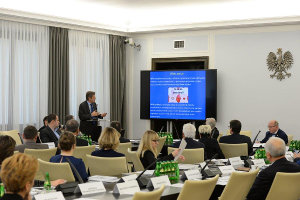 Hypertension, unhealthy diet, excess weight, obesity, smoking and hyperglycemia are the major risk factors of cardiovascular diseases. These factors can be divided in two groups: modifiable (such as smoking or bad diet) and those we cannot control (such as age or genetic factors). Recently we observe changes in the risk profile. More often the disease is related to excess weight, less often to high cholesterol levels or smoking.
Hypertension, unhealthy diet, excess weight, obesity, smoking and hyperglycemia are the major risk factors of cardiovascular diseases. These factors can be divided in two groups: modifiable (such as smoking or bad diet) and those we cannot control (such as age or genetic factors). Recently we observe changes in the risk profile. More often the disease is related to excess weight, less often to high cholesterol levels or smoking.
In the assessment of cardiovascular risk in individual patients we use a SCORE risk chart. It is a specific evaluation scale developed for the European population by an international group of experts working under the auspices of the European Society of Cardiology. By analyzing information about age, sex, cholesterol level, blood pressure and smoking habits we obtain an index estimating the risk of death due to cardiovascular disease. But the crucial factor is the daily life hygiene. We should know what are our blood pressure, weight, cholesterol level and exercise regularly.
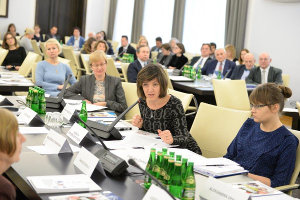 Commentary – Agnieszka Pochrzęst-Motyczyńska Polish Press Agency PAP „Service Health”: The awareness of risks and knowledge what really hides behind the formula ‘a group of high cardiovascular disease risk’ is very low in Poland. A patient, hearing such warning from the first contact doctor, usually does not know how to proceed with such information. It is difficult to fight a smoking habit or obesity of your own. Especially the older members of the society lack information and advice on proper diet to reduce the cholesterol level or what pharmacological aids are available to ease quitting the smoking habit.
Commentary – Agnieszka Pochrzęst-Motyczyńska Polish Press Agency PAP „Service Health”: The awareness of risks and knowledge what really hides behind the formula ‘a group of high cardiovascular disease risk’ is very low in Poland. A patient, hearing such warning from the first contact doctor, usually does not know how to proceed with such information. It is difficult to fight a smoking habit or obesity of your own. Especially the older members of the society lack information and advice on proper diet to reduce the cholesterol level or what pharmacological aids are available to ease quitting the smoking habit.
Prof. Maria Barcikowska-Kotowicz „Modern possibilities of neurological disease prevention”
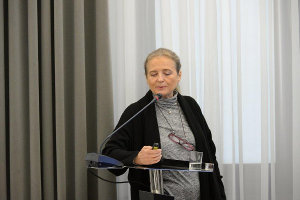 Prevention of age-related neurological diseases, such as brain stroke or dementia, should begin already in a middle age. In Poland we have 60-70 thousand cases of stroke per year, and about 20 thousand of stroke patients do not recover mobility and/or mental independence. Dementia, being a chronic state, poses a hard challenge to medical and care services. In Poland this is a group of nearly 500 thousand people. Unfortunately, only 20% of them are under a medical care.
Prevention of age-related neurological diseases, such as brain stroke or dementia, should begin already in a middle age. In Poland we have 60-70 thousand cases of stroke per year, and about 20 thousand of stroke patients do not recover mobility and/or mental independence. Dementia, being a chronic state, poses a hard challenge to medical and care services. In Poland this is a group of nearly 500 thousand people. Unfortunately, only 20% of them are under a medical care.
In both types of diseases, preventive activities are based in prevention of cardiovascular risk factors already in middle adulthood. Early diagnosis and pharmacological treatment of hypertension, diabetes, lipid metabolism disorders, heart rate dysfunctions and surgical interventions in coronary artery disease can prevent both strokes and Alzheimer’s disease and vascular dementia.
In order to recognize the signs of Alzheimer’s disease in its early stage and implement treatment we need secondary prevention. A patient with Alzheimer’s for the first 20-25 years show no signs that their brains are being destroyed by pathological proteins. However, it is the time when the appropriate treatment should be implemented. The level of pathological proteins can only be determined testing the cerebrospinal fluid. This test is very seldom performed at this stage of patient’s life in Poland.
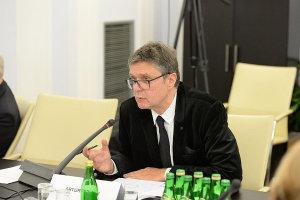 Commentary - Artur Wolski, Polish Radio Program 1: More and more often patients at different age are diagnosed with atherosclerosis, diabetes, hypertension, cardiac arrhythmia or obesity. Unfortunately, not many people know that these diseases can lead to dementia. But, both in progressing Alzheimer’s disease and after stroke, deterioration of patient’s functions is gradual and irreversible. A patient starts to have problems with thinking, connecting facts, memory, or orientation. Unfortunately, the number of people in advanced age, with cognitive impairments and possibly socially withdrawn in Polish society will grow. To prevent creating socially deprived castes, neurological disease prevention is crucial!
Commentary - Artur Wolski, Polish Radio Program 1: More and more often patients at different age are diagnosed with atherosclerosis, diabetes, hypertension, cardiac arrhythmia or obesity. Unfortunately, not many people know that these diseases can lead to dementia. But, both in progressing Alzheimer’s disease and after stroke, deterioration of patient’s functions is gradual and irreversible. A patient starts to have problems with thinking, connecting facts, memory, or orientation. Unfortunately, the number of people in advanced age, with cognitive impairments and possibly socially withdrawn in Polish society will grow. To prevent creating socially deprived castes, neurological disease prevention is crucial!
Prof. Sławomir Majewski „Skin cancer prevention”
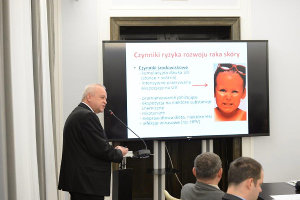 Skin cancer is one of the most common tumors. It is estimated that in the nearest 20 years their number will double. Most common is the basal-cell skin cancer and the squamous-cell skin cancer. Melanoma is less frequent, but it is the most aggressive. In skin cancer prevention the most important is the education of the society – creating the awareness of risk and changing the habits involving excessive exposure to sun. This education is a task not only for doctors, but also for the mass media.
Skin cancer is one of the most common tumors. It is estimated that in the nearest 20 years their number will double. Most common is the basal-cell skin cancer and the squamous-cell skin cancer. Melanoma is less frequent, but it is the most aggressive. In skin cancer prevention the most important is the education of the society – creating the awareness of risk and changing the habits involving excessive exposure to sun. This education is a task not only for doctors, but also for the mass media.
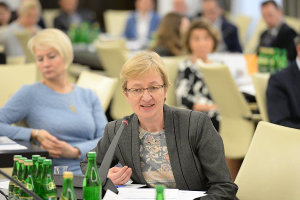 Commentary - Katarzyna Pinkosz „Do Rzeczy”: Prevention of skin cancer seems to be very easy. More and more people know how harmful sunshine can be. Nevertheless, still good vacation is synonymous with a suntan brought from an exotic journey. A very good solution is – passed recently as a legal act – prohibition of using the tanning devices for children before 18 years of age. I believe it will markedly reduce the risk of skin tumors in the youngest group of Poles.
Commentary - Katarzyna Pinkosz „Do Rzeczy”: Prevention of skin cancer seems to be very easy. More and more people know how harmful sunshine can be. Nevertheless, still good vacation is synonymous with a suntan brought from an exotic journey. A very good solution is – passed recently as a legal act – prohibition of using the tanning devices for children before 18 years of age. I believe it will markedly reduce the risk of skin tumors in the youngest group of Poles.
Prof. Piotr Andziak „Preventive screening in vascular surgery”
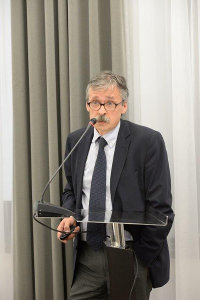 In vascular surgery we promote simple screening tests, especially in people over 60 years. We perform these tests using USG, which is non-invasive, painless and safe and allows early detection and monitoring of changes in arteries and veins in the whole body. These tests are useful for such diseases as abdominal aortic aneurysm or carotid artery stenosis.
In vascular surgery we promote simple screening tests, especially in people over 60 years. We perform these tests using USG, which is non-invasive, painless and safe and allows early detection and monitoring of changes in arteries and veins in the whole body. These tests are useful for such diseases as abdominal aortic aneurysm or carotid artery stenosis.
In most patients abdominal aortic aneurysm occurs and grows without any clinical symptoms. Often the first sign of the disease is an ischemic stroke or an aneurysm’s rupture. Results of studies and clinical experience show that aneurysm diameter over 5.5cm in men and 5.2 cm in women significantly increases the risk of rupture. Among patients with aortic aneurysm rupture, 80% die before arriving to the hospital. Screening USG test can detect aneurysm and patient can be scheduled for surgical intervention.
Carotid artery stenosis of more than 70% is an important factor of risk in ischemic stroke. Early detection in an USG gives us a chance to implement pharmacological or surgical treatment. Unfortunately, until now there have been no screening tests in Poland aimed at the detection of the carotid artery stenosis.
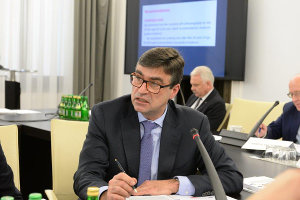 Commentary – Paweł Kruś „Świat Lekarza”: Besides classic USG methods used in screening, there are additional tests such as the Ankle-Branchial Index (ABI) that allows additional assessment of arteries in upper limbs. ABI is a proportion of blood pressure in a foot and in an arm artery. Its normal value is 0.9 - 1.15. Values below 0.9 indicate that there is stenosis, above 1.15 show that arteries are abnormally stiff, as in diabetes. I believe it would be worth considering purchasing the modern equipment for performing this test – it could be installed in a mobile diagnostic center that would travel allover Poland and be used to examine thousands of Poles.
Commentary – Paweł Kruś „Świat Lekarza”: Besides classic USG methods used in screening, there are additional tests such as the Ankle-Branchial Index (ABI) that allows additional assessment of arteries in upper limbs. ABI is a proportion of blood pressure in a foot and in an arm artery. Its normal value is 0.9 - 1.15. Values below 0.9 indicate that there is stenosis, above 1.15 show that arteries are abnormally stiff, as in diabetes. I believe it would be worth considering purchasing the modern equipment for performing this test – it could be installed in a mobile diagnostic center that would travel allover Poland and be used to examine thousands of Poles.
Prof. Mirosław Jarosz „Prevention of cancer and obesity is possible. We have evidence.””
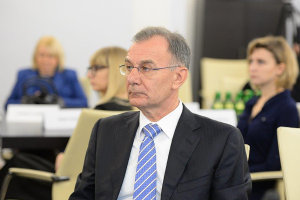 Recently, incidence of gastric cancer in Poland has fallen threefold. It is the effect of lower consumption of red meat and its products, animal fat, simple sugars and salt, and at the same time increased consumption of coffee, vegetables and fruits and reduction of smoking. A major problems remains in cancer prevention remains to be increase of obesity and of number of smoking women, consumption of alcohol, still too high consumption or red meat, salt and sweets, combined with too small consumption of milk products, roughage and fishes. It is, however, possible to fight against bad eating habits and obesity, for example with actions promoting healthy eating, also among children and adolescents.
Recently, incidence of gastric cancer in Poland has fallen threefold. It is the effect of lower consumption of red meat and its products, animal fat, simple sugars and salt, and at the same time increased consumption of coffee, vegetables and fruits and reduction of smoking. A major problems remains in cancer prevention remains to be increase of obesity and of number of smoking women, consumption of alcohol, still too high consumption or red meat, salt and sweets, combined with too small consumption of milk products, roughage and fishes. It is, however, possible to fight against bad eating habits and obesity, for example with actions promoting healthy eating, also among children and adolescents.
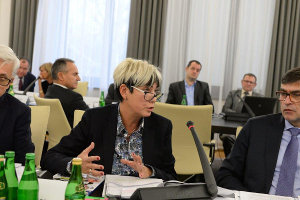 Commentary – Ewa Gwiazdowicz-Włodarczyk „Puls”: Our health is in our hands. A very valuable initiative has been recently presented by the Ombudsman for Children, who has appealed to the Ministry of Health to include dietary counselling in the basket of health services guaranteed by the social insurance. Unfortunately our children eat too little, mostly because parents and grandparents believe that a child cannot be hungry. According to a report prepared by the Supreme Audit Office, one in five schoolchildren is obese and parents do not know where to look for help in such situations.
Commentary – Ewa Gwiazdowicz-Włodarczyk „Puls”: Our health is in our hands. A very valuable initiative has been recently presented by the Ombudsman for Children, who has appealed to the Ministry of Health to include dietary counselling in the basket of health services guaranteed by the social insurance. Unfortunately our children eat too little, mostly because parents and grandparents believe that a child cannot be hungry. According to a report prepared by the Supreme Audit Office, one in five schoolchildren is obese and parents do not know where to look for help in such situations.
Prof. Krzysztof Kochanek „Hearing screening”
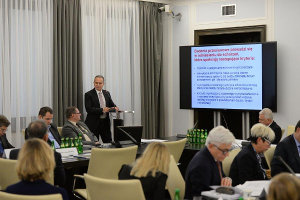 The Institute of Physiology and Pathology of Hearing has been conducting hearing screening for almost 20 years. Altogether in the years 1999–2017 they have encompassed more than 1 million people in various age groups, mostly school age children. Our results show that congenital hearing disorders are found in 1-2 in 1000 newborns, but at school age problems with hearing has 1 in 5-6 children. In the group of seniors, 65+, hearing loss affects nearly 75% of people.
The Institute of Physiology and Pathology of Hearing has been conducting hearing screening for almost 20 years. Altogether in the years 1999–2017 they have encompassed more than 1 million people in various age groups, mostly school age children. Our results show that congenital hearing disorders are found in 1-2 in 1000 newborns, but at school age problems with hearing has 1 in 5-6 children. In the group of seniors, 65+, hearing loss affects nearly 75% of people.
Major hearing screening programs conducted in Poland in the recent years include:
- screening in schools in rural areas and small towns, conducted by the Institute of Physiology and Pathology of Hearing in cooperation with the Levy Fund of Agricultural Social Insurance and the Agricultural Social Insurance Fund (KRUS) (in total 470 000 children),
- program of hearing screening in first and sixth graders in Warsaw (more than 164 000 children)
- screening programs conducted in cooperation with different municipalities and Ronald McDonald Foundation
- hearing screening in different regions of Poland with the Mobile Hearing Center of the Institute of Physiology and Pathology of Hearing during the ‘Summer with the Radio’ tours in 2016 and 2017
- hearing screening conducted under the framework of the program ‘Health First’.
Local programs of preventive hearing screening examinations have been started in many cities and towns, and in several voivodships – regional hearing screening programs aimed at screening the entire population of children at the beginning of school education and at implementing these programs on a permanent basis in schools.
Poland has made an important contribution to the publicizing the idea of hearing screening in school age children in Europe in form of signing, on the initiative of the Institute of Physiology and Pathology of Hearing, of the European Scientific Consensus on Hearing Screening in Warsaw in 2011 and adoption of the EU Council Conclusion on Early Detection and Treatment of Communication Disorders in Children on 2 December 2011.
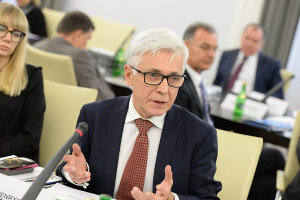 Commentary – Henryk Szrubarz Polish Radio Program 1: Hearing screening programs organized by the Institute of Physiology and Pathology of hearing are conducted in Poland and abroad on an unprecedented scale. Thank to these programs, thousands of Polish children have been examined and parents could learn not only about an eventual hearing impairments, but also where to look for help.
Commentary – Henryk Szrubarz Polish Radio Program 1: Hearing screening programs organized by the Institute of Physiology and Pathology of hearing are conducted in Poland and abroad on an unprecedented scale. Thank to these programs, thousands of Polish children have been examined and parents could learn not only about an eventual hearing impairments, but also where to look for help.
